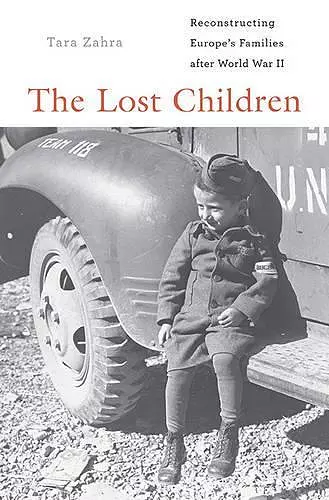The Lost Children
Reconstructing Europe's Families After World War II
Format:Hardback
Publisher:Harvard University Press
Published:10th May '11
Currently unavailable, and unfortunately no date known when it will be back

Across a European landscape shattered by the death and displacement of World War II and the Holocaust, an extraordinary humanitarian agenda crystallized: saving the children. Tara Zahra's elegantly written history brilliantly reconstructs the moment, offering a breakthrough example of the new transnational European history. -- Samuel Moyn, author of The Last Utopia Zahra deftly draws important lessons about conceptions of childhood and nationality from the ways international organizations, individual countries, and families themselves sought to rebuild shattered lives. An essential contribution to our understanding of a refashioned postwar world. -- Norman Naimark, author of Stalin's Genocides Innovative and compelling, Zahra's book brilliantly challenges our understandings of trauma, relief, and rehabilitation, carefully elucidating the competing and highly ideologized claims on children by family and nation after a war that had devastated both. -- Atina Grossmann, author of Jews, Germans, and Allies A fascinating, important, and highly original book which considers the implications and consequences of World War II for children. -- Larry Wolff, author of Inventing Eastern Europe Beautifully written and exhaustively researched, The Lost Children makes the story of family reconstruction central to the history of social and political reconstruction in the years following the end of the Second World War. -- Robert Moeller, the University of California, Irvine
World War II tore apart an unprecedented number of families. This is the heartbreaking story of the humanitarian organizations, governments, and refugees that tried to rehabilitate Europe's lost children from the trauma of war, and in the process shaped Cold War ideology, ideals of democracy and human rights, and modern visions of the family.During the Second World War, an unprecedented number of families were torn apart. As the Nazi empire crumbled, millions roamed the continent in search of their loved ones. The Lost Children tells the story of these families, and of the struggle to determine their fate. We see how the reconstruction of families quickly became synonymous with the survival of European civilization itself. Even as Allied officials and humanitarian organizations proclaimed a new era of individualist and internationalist values, Tara Zahra demonstrates that they defined the "best interests" of children in nationalist terms. Sovereign nations and families were seen as the key to the psychological rehabilitation of traumatized individuals and the peace and stability of Europe. Based on original research in German, French, Czech, Polish, and American archives, The Lost Children is a heartbreaking and mesmerizing story. It brings together the histories of eastern and western Europe, and traces the efforts of everyone--from Jewish Holocaust survivors to German refugees, from Communist officials to American social workers--to rebuild the lives of displaced children. It reveals that many seemingly timeless ideals of the family were actually conceived in the concentration camps, orphanages, and refugee camps of the Second World War, and shows how the process of reconstruction shaped Cold War ideologies and ideas about childhood and national identity. This riveting tale of families destroyed by war reverberates in the lost children of today's wars and in the compelling issues of international adoption, human rights and humanitarianism, and refugee policies.
In this impressive multinational study, Zahra charts the history of humanitarian relief from the 1915 Armenian genocide to the postwar era, in the process demonstrating how the institutions of the family became politicized, whereby governments across Europe after 1945 began concerning themselves with promoting the family unit. Zahra demonstrates the impact of pre-1939 humanitarian campaigns on wartime thought. -- Frederic Krome Library Journal 20110501 Zahra's research examines the difficulties inherent in attempting to mend the social dislocation caused by war...Zahra's work is insightful in considering what treatment of lost children can tell us about broader developments in the post-war period, both in terms of how nations interacted with each other and how psychologists understood the impact of war on children. -- Hester Vaizey Times Higher Education 20110505 [A] fascinating book...Tara Zahra, a historian who made her name writing about the ambiguities of nationality in Czechoslovakia, has now added an important contribution to the growing literature on Europe's reconstruction after World War II...Zahra is especially good at tracing the connections between pedagogic theories and nationalist politics, and her rich source basis allows her to demonstrate the ubiquity of the problem. -- Mark Mazower New Republic online 20110620 [A] superb book...[A] wide-ranging, exceptionally well-researched study. -- Adam Kirsch Tablet Magazine 20110628
ISBN: 9780674048249
Dimensions: unknown
Weight: unknown
320 pages